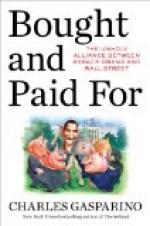There was no bitterness, no jealousy in this apparent rivalry. Fanny was devoted to her little sister and proud of her cleverness. She declared that one day Virginia would make a brilliant marriage and then she could pay it all back. That Virginia should ultimately go to college had been fully determined on. Everything attracted her to a liberal education. She was ambitious; she craved knowledge and showed talent in almost everything—in music, composition, painting. To her a liberal education would mean everything—the widening of her mental horizon, the initiation into keen, intellectual delights. No matter what sacrifice was to be made, to college the girl should go. So declared the parents.
Now all was changed. This blow which robbed her of her father also shattered her hopes for the future. All this flashed through Virginia’s mind as they sat there, waiting. Turning to her sister, she said through her tears:
“If the worst happened—Fan—if Dad died—we couldn’t go on living here, could we?”
Fanny shook her head. Sagely she replied:
“No, I’m afraid not. Father’s got no insurance. Mother says we’ve lived up to everything. I guess I’ll have to go to work—”
“So will I,” said Virginia quickly.
“What nonsense you talk, Virgie!” interrupted her sister almost angrily. “As if you were intended for work! Nature intended you to be a lady, and a lady you’ll be if I have to work all the flesh off my bones. Don’t you suppose mother and I haven’t talked it over already.” With mock contempt she went on: “You work! What at, I’d like to know. Giving music lessons or writing articles for the ten-cent magazines! It’s different with ‘yours truly.’ I’m not a highbrow. I never cared for books or culture and all that sort of thing. But I guess as a saleslady in some store I’ll make a hit. Anyway, I’ll make enough to keep things going—so there’ll be enough for you and mother. Now—there isn’t any use arguing. It’s college for yours, Virgie, and when you graduate you’ll marry a millionaire and we’ll all be happy and comfy.”
Virginia was about to protest when suddenly there was a commotion behind them. The bedroom door was abruptly opened and Dr. Everett came in, supporting Mrs. Blaine, who was weeping bitterly. The two girls sprang to their feet with a startled cry.
“How’s father?” they exclaimed.
Staggering to a chair, Mrs. Blaine clasped both her children to her breast.
“Your father is in Heaven!” she murmured.
Then she fell prostrate on the sofa, her whole being shaken by convulsive sobs. Virginia, panic-stricken, darted forward, but the Doctor held out a restraining hand.
“Don’t, child—let her cry. It will do her good.”
Chapter II.
“Fanny! Where are my scissors? Did you take my scissors?”




